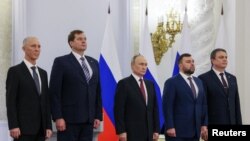In a ceremony in the Kremlin's opulent white-and-gold St. George's Hall, Russian President Vladimir Putin, and the Russian-installed leaders of the four Ukrainian regions put their names on treaties for them to join Russia, in a sharp escalation of the seven-month conflict.
In response to the signing ceremony, Ukrainian President Volodymyr Zelenskyy and Kyiv’s western allies, dismissed the annexation by calling it illegitimate and vowed to retaliate with new sanctions.
Zelenskyy held his own signing ceremony in Kyiv, releasing video of him putting pen to papers he said were a formal NATO membership request, calling it an “accelerated” application.
Putin has repeatedly made clear that any prospect of Ukraine joining the military alliance is one of his red lines and cited it as a justification for his invasion, now in its eighth month, in the biggest land war in Europe since World War II.
Of Putin's annexation, President Joe Biden said: “Make no mistake: These actions have no legitimacy.”
Putin said his forces will defend the newly annexed territories “by all means necessary,” leaving western officials alarmed over the implicit threat of nuclear weapons.
“The points that we have made both publicly and privately to the Russians is that the consequences would be real and extraordinary,” said U.S. State Department Spokesperson Ned Price, adding, “The use of any nuclear weapons in this conflict would carry those consequences.”
U.S. Senator Lindsey Graham supported Price’s sentiments and added, “The use of a nuclear weapon by Russia would be an attack on NATO itself.”
“The radiation would not be confined to Ukraine, it would be radiating in parts of Europe that are under the NATO banner,” said Graham.
Michael Kimmage, an expert on U.S. – Russia relations, says it is impossible to know whether Moscow’s leader is truly considering the use of nuclear weapons.
“That would be an enormous step for Russia to take and would change its image perhaps irretrievably on the international stage,” said Kimmage, adding, “It is unclear as to whether it will lead to any different military results.”
The separatist Donetsk and Luhansk regions in eastern Ukraine have been backed by Moscow since declaring independence in 2014, weeks after the annexation of Ukraine's Crimean Peninsula.
The southern Kherson region and part of neighboring Zaporizhzhia have been under Russian control since early in in the conflict, which began in February.









